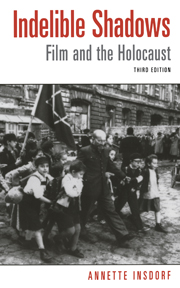Book contents
- Frontmatter
- Contents
- Foreword by Elie Wiesel
- Preface
- Introduction
- I Finding an Appropriate Language
- II Narrative Strategies
- III Responses to Nazi Atrocity
- IV Shaping Reality
- 12 The Personal Documentary
- 13 From Judgment to Illumination
- V Third Edition Update
- Annotated Filmography (Third Edition)
- Filmography (Second Edition)
- Notes
- Bibliography (Second Edition)
- Bibliography (Third Edition)
- Relevant Websites
- Index
13 - From Judgment to Illumination
Published online by Cambridge University Press: 14 January 2010
- Frontmatter
- Contents
- Foreword by Elie Wiesel
- Preface
- Introduction
- I Finding an Appropriate Language
- II Narrative Strategies
- III Responses to Nazi Atrocity
- IV Shaping Reality
- 12 The Personal Documentary
- 13 From Judgment to Illumination
- V Third Edition Update
- Annotated Filmography (Third Edition)
- Filmography (Second Edition)
- Notes
- Bibliography (Second Edition)
- Bibliography (Third Edition)
- Relevant Websites
- Index
Summary
Documentaries tend to do poorly at the box office, where audiences prefer diverting fiction to stark reality. This is unfortunate, because some of the most powerful and important films about the Holocaust are “nonfiction” but not “nondramatic.” Consequently, television has played a significant role in bringing at least two of the following to American audiences: Kitty: Return to Auschwitz, The Sorrow and the Pity (both telecast on PBS), and The Memory of Justice. All three are compelling personal documents – moving pictures that achieve their greatness through uniquely cinematic means. Brave and often abrasive, they demonstrate that the facts of the Holocaust are richer than the fictions an artist could invent. Particularly in the films of Marcel Ophuls, the montage is the message – namely the juxtaposition of multiple viewpoints which, together, shed light on human response and responsibility.
When Kitty: Return to Auschwitz (1980) was aired on American television, on February 4, 1981, the question raised after Holocaust – how much truth can be found in a fictional reconstruction of the Nazi era? – was replaced by the acknowledgment of how much drama could inhere in documentary. This ninety-minute film directed by Peter Morley for Yorkshire Television in Great Britain is real “docudrama” – the simple presentation of one survivor's recollection that yields a profoundly moving and often shattering story. Kitty Felix Hart, a fifty-one-year-old radiologist in Birmingham, returned in 1978 to Auschwitz – where she and her mother had been prisoners for two years – with her son David, a Canadian doctor.
Information
- Type
- Chapter
- Information
- Indelible ShadowsFilm and the Holocaust, pp. 221 - 242Publisher: Cambridge University PressPrint publication year: 2002
